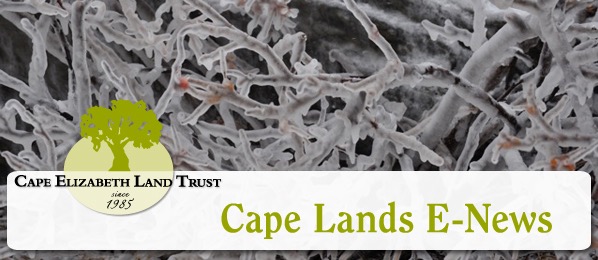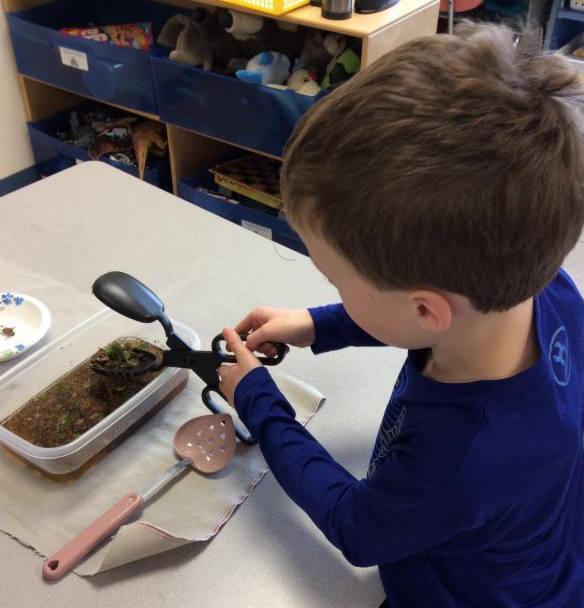| |
 |
Consider Joining CELT Staff in Viewing
a New Conservation Film
January 26th
The Brunswick-Topsham Land Trust and Maine Coast Heritage Trust will be screening a special documentary that highlights an intriguing range of land conservation initiatives in our state.
"Community Conservation: Finding the Balance Between Nature and Culture," was created by Mark Ireland, and profiles the work of four active Maine land trusts.
It depicts the efforts by these organizations to work with their communities to identify local needs and
interests that relate to the land. For example, protecting a sledding hill because community members have stated that as a priority. There will be a question and answer session following the film.
Time: 7 - 9 p.m.
Location: Brunswick's Frontier Cafe and Cinema
at the Fort Andross Mill Business Center
Tickets are $5, and reservations are highly encouraged, as tickets are limited to the size of the theater.
For more details about the film, and for tickets, go online for the Frontier Cafe.
|
|
CELT Education Coordinator Introduces
New Feature for Teachers
 Teachers can now book a classroom program with Linden Rayton, directly through her online calendar. Seven K-6 programs are currently offered. These programs are designed to bring environmental education to classrooms throughout the whole school year, without putting the burden of organizing on the teacher. Teachers can now book a classroom program with Linden Rayton, directly through her online calendar. Seven K-6 programs are currently offered. These programs are designed to bring environmental education to classrooms throughout the whole school year, without putting the burden of organizing on the teacher.
Programs include exploring with binoculars, building an outdoor waterproof shelter, exploring the science of plastic and recycling, and imitating different bird beaks. You can read the full program descriptions
here.
This booking calendar was suggested by Tara Bucci, 4th-grade teacher at Pond Cove and member of the CELT Education Committee. The first teacher to try it was Karen Ferry, who booked the Bird Beak
 Buffet program for her first grade classroom.
Karen had this to say about her the program: "The Bir
d Beak Buffet Program is an outstanding learning experience for all ages! First, the students learned about six different kinds of bird beaks...and the students were then able to get their hands on tools that were just like bird beaks. With 'beaks' in hand, they had to pick up food and place it in a bowl. This lesson was super fun and the students learned a lot. I highly recommend signing up for one of these programs!"
Environmental education is recognized as an incredibly effective way to teach students. (As supported here!) Y
et it's often hard to incorporate into existing curricula that prioritize traditional methods of education. We hope this easy, calendar booking system will increase connections between CELT and our schools, to the benefit of our entire community.
|
Lots of Fun Events Going On This Winter...
January 21st:
Snow Shoe Outing in Robinson Woods
- DATE CHANGED
Now rescheduled for February 11,
3-5 p.m., snow dependent.
Cape Elizabeth Land Trust Executive Director Cindy Krum and long-time CELT supporter Tony Owens will
guide us on a two-hour snowshoe adventure through the snow-laden trails of Robinson Woods. We'll explore the fields, woods and wetlands to gain a perspective of this wonderful property in winter. Please bring your own equipment and dress accordingly. R
egister through Community Services; program #73-161.
February 4th:
Animal Tracking for Families
at Great Pond, 9:30 - 10:30 a.m.
CELT's Education Coordinator Linden Rayton will help us learn to identify common winter animal tracks and we'll practice tracking too. Warm, dry clothing and footwear are a must. Children attending should be at least 6 years old, and accompanied by an adult. Register through Community Services; program #73-352.
February 9th: Good Night, Cape Elizabeth,
6 - 7 p.m.
Children ages 2-6 (with an adult) are invited to the CELT office to enjoy a bedtime hour about our "cold-weather friends," winter animals in Maine. Children's Librarian Rachel Davis, author Melissa Kim, and CELT volunteer Jill Darling will share stories, a craft, and a brief visit outdoors to see what animal signs we might find in winter. Come in your pajamas, and bring a snack. Parents or guardians must be present. Register through Community Services, for program #73-353.
February 10th: Full Moon Viewing
(back-up date is February 11),
7 - 8:30 p.m.
Dress in your warmest winter clothes and join CELT on Trundy Point beach to check out the February full moon. We will have a telescope and the guidance of astronomer and educator Kerry Kertes to help us explore the moon and the night sky. Warm up and socialize next to our beach bonfire. Because this is cloud-dependent, we may choose to use the back-up date. Register with Community Services, program #73-162.
All of our winter programs can be viewed on our
website.
Participants must register at least 48 hours in advance to receive notification of changes or cancellation.
|
Naturalist's Corner:
Where Do Insects Go in Winter?
One thing I appreciate about winter is the dearth of insects, as I am particularly susceptible to bug bites. While I'm enjoying months without their presence, insects of all kinds are accommodating the winter with many different strategies.
There are a hardy few who are active. As we've noticed here in Cape (to our dismay) non-native winter moth adults (Operophtera brumata), are active on winter days when the temperature is around freezing. When the temperature drops below freezing, these moths find a safe, dry place and enter torpor, a state of very low metabolic rates that keeps the insect alive but not active. As a result, organisms in torpor do not need to eat. There are many degrees of torpor, and some insects may be more torpid than others. 
Many insects that are not active are either "freeze-avoidant" or "freeze-tolerant." Freeze-avoidant insects make sure to find an overwintering spot that is dry and dust-free for their own torpor. In order to freeze, cooling water must be exposed to a hard particle, such as dust, that stimulates the phase change from liquid to solid. If there are no particles, water can "super-cool" without freezing to as low as -43.5 F! Freeze-avoidant insects can thus be super-cooled without actually freezing. Insects can also achieve freeze-avoidance by making sugars in their body that lower their internal freezing point (antifreeze). And freeze-tolerant insects actually freeze solid all winter long. Local freeze-avoidant insects include stink bugs and assassin bugs. A local freeze-tolerant insect is the woolly bear
(
Pyrrharctia isabella
).
Some insects "accommodate" the winter by having very short life cycles and leaving their eggs or larvae to overwinter. Aquatic insects such as mayflies, caddisflies and dragonflies all overwinter as larvae, or nymphs. If underwater temperatures become too cold, these nymphs will migrate deeper into the water or substrate to find relative warmth.
All insects active in the winter can only do so because there are things to eat. The surface of the snow is a microclimate in its own right, and full of other, smaller organisms that these insects prey upon. Just another wonder of winter! -
Linden Rayton, CELT Education Coordinator
|
CELT Board Profile: Bill Luneburg
One of CELT's newest board members wears many hats for us. Bill Luneburg is chair of the Lands Committee, which focuses on acquiring easements and new properties, and a member of the Executive Committee. He also sits on the Stewardship Committee and its subgroup dealing with the preparation of a land management plan for Robinson Woods.
 Bill began volunteering with CELT in 2015, not long after he and wife Pat moved to Cape. He was retired from teaching law at the University of Pittsburgh. "I had done a lot of volunteering, particularly in the environmental area, and it was a natural for me to join the Land Trust, given how beautiful the Cape is. Also, I'd been active in sustainable development as a docent at the Phipps Conservatory's Center for Sustainable Landscapes (in Pittsburgh) which further focused my attention on habitat protection and recovery efforts." Bill began volunteering with CELT in 2015, not long after he and wife Pat moved to Cape. He was retired from teaching law at the University of Pittsburgh. "I had done a lot of volunteering, particularly in the environmental area, and it was a natural for me to join the Land Trust, given how beautiful the Cape is. Also, I'd been active in sustainable development as a docent at the Phipps Conservatory's Center for Sustainable Landscapes (in Pittsburgh) which further focused my attention on habitat protection and recovery efforts."
When asked about his favorite spot in town, Bill is effusive about "really everywhere," but adds, "I do love Robinson Woods and the trails there." Bill also enjoys photography, boating and ice skating. "I would love to go back to playing ice hockey, but my wife won't let me."
He's also an avid reader and recommends a recent favorite: The Snail Darter and the Dam, How Pork Barrel Politics Endangered a Little Fish and Killed a River.
|

From Our
Executive
Director...
As a gift this winter I received the book, Winter World: The Ingenuity of Animal Survival, by Bernd Heinrich. What I like most about this book is that it's based on the author's observations, often depicted in drawings, from growing up and living as an adult in the Northeast. Although I've taught winter ecology in the past, I am learning some fascinating new facts. For example, to escape a snowstorm or a cold night ruffled grouse tunnel into the snow. Kinglets huddle together in the middle of a pine, looking like one ball of fluff with tail feathers sticking out in a circle.
I've been wondering about how the animals in our neighborhoods and on the CELT properties are responding to the temperature fluctuations. How do they manage? During one of the recent extremely cold spells, I saw a frozen vole in the grass that had not made it through the night. On a particularly warm day, a skunk pranced through our yard in the early morning. (Fortunately, I had grabbed the dog in time.) Although skunks are not hibernators, they are typically dormant in cold months for extended periods of time. Maybe this one was just warming up with a stroll?
If you are inclined, read Winter World to inspire your curiosity as you explore this season.
Cindy Krum
CELT Executive Director
Cape Elizabeth Land Trust
|
|
|
|
|
|
|